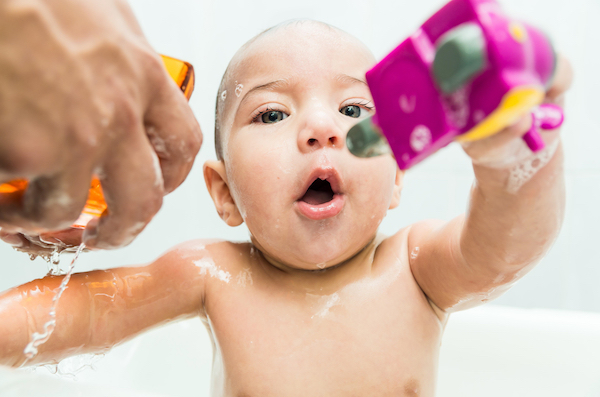Is your kid clean enough?
You may be lucky enough to have a child who loves baths, washes hands before every meal and brushes teeth like a pro.
Oh, wait. This isn’t fiction. The truth is, in most cases, children need a little nudge here and there when it comes to practicing good hygiene.
But I thought a little dirt was good?
Many studies have come out to support the fact that a little dirt is, in fact, good for our children’s health. Particularly when children are young, exposure to dirt and germs in the environment help build healthier immune systems.
But while we don’t need to be constantly dousing ourselves in antibacterial cleanser, good, practical hygiene is also important for us to stay healthy. It’s also good for us personally and socially. While young children don’t ever seem to get too stinky—no matter how much dirt they accumulate while playing—practicing good hygiene from the time children are toddlers helps them maintain good habits as they grow up and move into adulthood.
Brushing up on good hygiene
From hand-washing and potty habits to teenage acne and post-sport showers, here’s a quick test of your hygiene know-how—answers included, thanks to Dr. Kathryn McLeod, a pediatrician with Augusta University Health.
1) I should wash my hands:
A) For 10 seconds;
B) For 20 seconds;
C) For 30 seconds.
According the U.S. Centers for Disease Control and Prevention, 20 seconds is long enough to properly wash your hands. “Your child might get bored counting off the time, so a fun alternative is for your child to sing the Alphabet Song or sing Happy Birthday twice while scrubbing up,” said Dr. McLeod.
2) It’s most important to wash hands:
A) Before meals and bedtime;
B) After using the bathroom;
C) After touching pets, especially reptiles like lizards or turtles;
D) Before helping in the kitchen;
E) All of the above.
All of the above instances are exactly when children need to wash their hands. In particular, children need to adopt the good habit of always washing their hands after using the bathroom. Other good habits? Teach girls to always wipe from front to back. “Sometimes it’s hard for kids to remember to flush, too,” said Dr. McLeod. “One thing I did when my children were young was to hang a little sign on the doorknob to remind them to flush the toilet.”
3) Children can begin brushing their own teeth when they:
A) Turn 5 years old;
B) Can tie their own shoes;
C) When they ask to.
Toddlers may want to start brushing their own teeth at a surprisingly young age, but children don’t have the manual dexterity to really properly clean their own teeth until they are old enough to tie shoes on their own. Until then, parents can encourage children to practice brushing, but parents should always give teeth a once-over as well. It’s recommended that everyone—parents too!—brush their teeth for about two minutes. Flossing is important too, but if the long string of floss is difficult for your child to handle, individual flossers are easy and fun.
4) Bath time should happen:
A) Every night;
B) Every two days;
C) When children seem sweaty or dirty.
“A nightly bath is just a nice part of the bedtime routine,” said Dr. McLeod. Bathing every night has also been shown to reduce the risk of bacterial skin infections, especially if children have skin conditions like eczema. However, if you do a nightly bath, just make sure not to use a perfumed or harsh soap as that can be irritating and drying to your child’s skin. Ditto with bubble bath—if your child loves the bubbles, limit it to maybe once a week. Use a gentle, non-scented soap and moisturize after the bath as needed.
5) Body odor in kids:
A) Doesn’t happen;
B) Is natural;
C) Can be reduced;
D) All of the above.
The truth is, your child may never have body odor—or your child’s personal chemistry may emit a musky aroma. After kids sweat—such as during sports season—or when they hit puberty is when parents may start noticing body odor, including “stinky foot syndrome,” in kids. To help reduce body odor, kids should always shower after practicing or playing a sport. Antiperspirant can be applied for day-to-day activities. And a scented powder can help keep feet drier—and fresher.
6) Acne:
A) Is just part of the teenage experience;
B) Should be treated as soon as possible.
Your child might be embarrassed to talk about the state of his or her skin, but don’t avoid it and don’t think it will go away on its own. Research has shown that treating acne early really does help keep it from getting worse down the road. So if your child doesn’t bring it up, you should. Treatment can be as simple as changing to a gentle soap to wash the face both morning and night and applying an over-the-counter benzoyl peroxide product. “That’s the first line of treatment,” said Dr. McLeod. “If that’s not effective, then it’s time to visit your doctor to explore prescription options.”
Acne is also a very good reason why children should wash their hands—and clean their phones since oil and grime from hands ends up there, and phones are then held next to the face. “Kids also shouldn’t pick any bumps,” said McLeod. “In fact, it’s a good idea for children to practice the habit of keeping their hands off their faces, which will also help reduce acne.”




